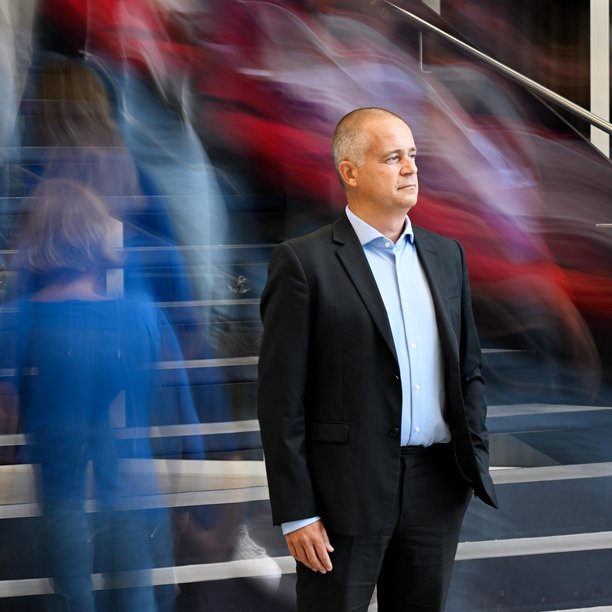‘Dreaming big in a department to be proud of’
Kees Storm is one of three new deans appointed on September 1st to the departments of Applied Physics & Science Education, Mechanical Engineering, and Mathematics & Computer Science. We find out more about these new leaders in a three-part series.
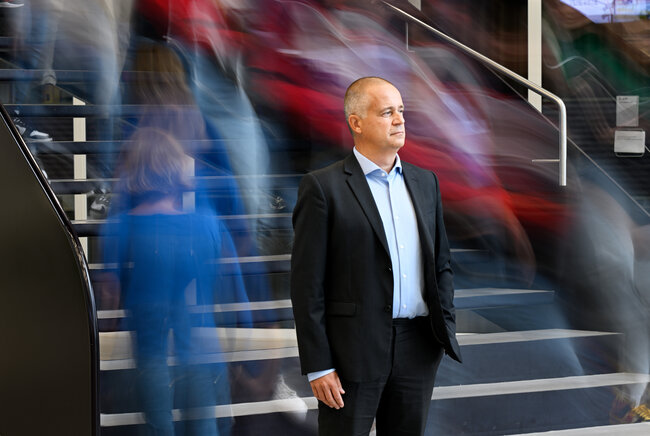
Bigger and better. This is how newly appointed dean Kees Storm of Applied Physics & Science Education (APSE) envisions his department in ten years’ time. His aim is to get people on board, with everyone working together towards a bigger, better, and safe department. And he’s going about it in his own ‘Stormian’ manner: with humor and a personal touch, unshakable positivity, and a healthy dash of naivety. But he is always well-informed and has facts on his side.
The very first speech Dean Kees Storm (49) gave to researchers in his department, Applied Physics & Science Education, was overtaken by events before he delivered it. He had originally planned to talk about key strategic themes and their impact on his department, but when the day came, he focused on just one topic: growth!
“Of course, very many themes are important to our department, but the university’s plans for growth are paramount right now,” says Storm. “The challenges they pose for the Executive Board and all the departments are so great that they require commitment from each and every staff member.”
In Storm’s view, growth isn’t purely about quantity, it’s also about quality. “And about how we can do things better. Better in terms of our output and the relevance of our work, but also better for the well-being of the people employed here. Ensuring they can do their jobs safely, both in the lab and in their social interactions.”
‘Hi, we’re the new people in charge and we’re doubling the size of everything. Get to it!’ Of course it doesn’t work like that.
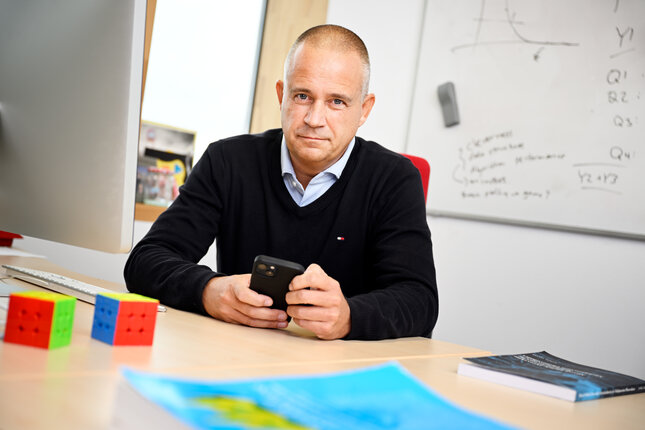
Storm says that he felt a bit apprehensive about how his narrative would be received within the department. “It couldn’t help but seem a bit like ‘Hi, we’re the new people in charge and we’re doubling the size of everything. Get to it!’ It doesn’t work like that of course. This is the very beginning of a much broader discussion. It helps that I genuinely believe a lot of great things can be achieved if we embrace the proposed growth.
“As a university we have a responsibility to seek solutions to global problems, such as the energy transition and the climate situation. Everything that’s needed to solve these problems is produced here in the Brainport region, and this work is one of the things we’re training the engineers of the future to do.” He qualifies his remark: “Personally, I find the global perspective important, but not everyone feels the same way. Similarly, not everyone finds it self-evident that as a university you should contribute to whatever your local industry is doing.”
Dream big
What does pique everyone’s interest, he believes, is showing that the plans for growth offer the scope to dream big. “To be able to teach more students, we need more people. This raises the interesting question: ‘What are all these new people going to be doing here?’ Will they be building on what we’re already good at, or doing entirely new things?
“Can we, for example, set up a new research group in optics or machine learning? Or do we want a climate science group, or one in science education? All kinds of doors are opening, and it’s time for us to rethink what kind of department we want to be. That’s what makes people prick up their ears. We aren’t asking our staff to work twice as hard and keep on doing the same thing. No, growth also means the scope to dream about the new things we could be doing.”
When it comes to growth within the university’s educational offering, Storm has high expectations of the Eindhoven School of Education (ESoE), with which his former department has merged to form the Department of Applied Physics & Science Education (APSE). “As well as training teachers, they research teaching and learning approaches, such as Challenge-based Learning. Having data about the education we are delivering is helpful, and complementary to hearing from the students themselves."
“Ultimately, we are scientists, people who prefer to make decisions on the basis of data and facts. The researchers at ESoE play a hugely important role, and going forward they can help us upscale our education provision in a responsible way.”
Growth doesn’t mean that our staff have to work twice as hard. It means there will be scope to dream about the new things we could be doing.
Storm is enough of a realist to recognize that finding the right talented people will be a significant challenge. “There’s no secret ‘reservoir’ we can dip into, but I’m certain there are groups we could do more to appeal to. How can we show them that this is a great place to work? Each of the inspiring new colleagues and teammates this will bring in will make us just a little better than we already are. I’m really looking forward to the challenges involved in recruitment, although I’ll definitely have a lot to learn too.”
Storm greatly admires the boldness shown by the Executive Board with its plans for growth: “That’s what’s so awesome about TU/e and Eindhoven. They say, ‘We’re going for it. Sure, no doubt it will spark discussion about whether we should be wanting to grow, but we want to investigate whether we can meet the demand in the Brainport region’. That takes guts.”
In order to grow at all, four conditions must first be met:
-
Up-front government funding to facilitate growth and to prevent the current workload from increasing further.
-
Growth should not come at the expense of excellence.
-
Growth should be gradual to keep the workload manageable.
-
The region must ensure that the infrastructure and facilities are in order.
More women
This bold spirit also came to the fore in setting up the Irène Curie Fellowship, which gives precedence to women scientists when academic vacancies at TU/e are being filled. Its introduction drew plenty of opposition, and the measure was shelved temporarily while it was under review by the Netherlands Institute for Human Rights.
For Storm, the need to hire more women is a no-brainer. In recent years he has been a heartfelt and outspoken advocate of the policy of affirmative action for female scientists in filling vacancies. “It is unacceptable that in a field as important as technology we have such a significant imbalance in the representation of men and women. Other universities in the Netherlands and elsewhere in Europe are showing that it can be done better. This prompts the need for critical self-appraisal and rigorous new proposals. I felt very proud when we introduced this policy.”
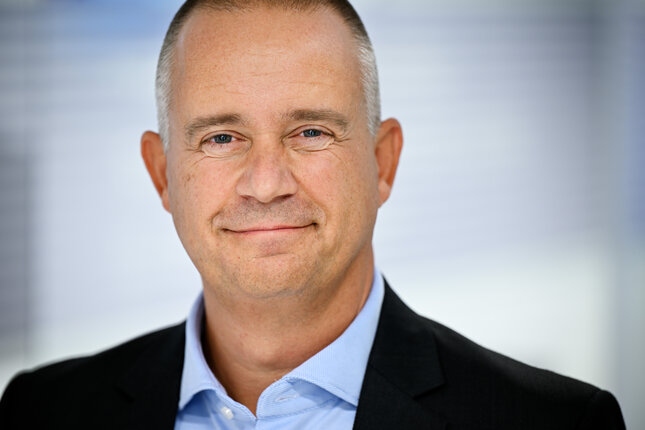
Imposter syndrome
In his office in Flux, where we speak to him on the twentieth day of his deanship, Storm repeatedly adopts the modest position of underdog. “I admit to suffering a little from imposter syndrome,” he confirms.
“I always assume that other people are better than I am. I know I’m not the best physicist in the world, although I’ve certainly done my bit in my field. To new people in the group (Soft Matter and Biological Physics, ed.), I always say, ‘I’m going to assume you can do this much better than I can.’ I take the view that they’re smarter than me.
“It’s my job to ensure they have everything they need to grow and accomplish their research and teaching activities. That gives me so much more satisfaction than seeing my name on a published paper. Ultimately, there’s only one thing I want and that’s for us all to be immensely proud of our group, our department, and our university. In my experience, a lot of good things stem from a sense of pride in what you’ve built together.”
Maintaining a feel for things
With the 0.8 FT that Storm devotes to running the department, too little time is left for him to give his group the leadership it needs. He has now passed the role of chair to Liesbeth Janssen. “I have every faith in the PIs (principal investigators, ed.) in our group, and am intrigued to see all the amazing things they’re going to come up with in future.
“I’m still supervising doctoral candidates and I’m keeping my mentoring role within the group. I’ll also continue to teach courses. Other deans have told me that it’s important to maintain a feel for things, to know what it’s like to work in the department.”
My first twenty days as dean were utter mayhem.
In the course of our conversation, Storm often remarks that he has held his position only a short while, a reminder that he’s new to the job. “My first twenty days were utter mayhem. Extrapolating the future from this, I can see I’ll never be able to do anything new ever again,” he says with a wink.
“Roughly half of what’s landed on my plate are things I knew were part of the deanship. But every day I’m also getting emails that make me think, ‘Seriously, is this really a matter for me?’ The answer is always ‘yes’. Well, at least it’s very varied.”
With effect from October 1st, Sofia Calero was appointed as vice dean, bringing the APSE board of three back to full strength. “Now, together, we can really start building. We’re still having to improvise a little, but together we’re managing to keep the situation workable. And I don’t mind firing up my laptop now and then in the evening occasionally. Not that I feel pressured to do so; I really enjoy my work and it’s usually no bother.”
Princeton sabbatical
It was while he was on sabbatical in Princeton, at the Brangwynne Lab for Soft Living Matter, that the news dropped in Eindhoven that Kees Storm was to become the new dean of the Department of Applied Physics & Science Education. His appointment came about by a circuitous route, he explains.
“I was interested in taking over the role of the outgoing vice dean, Ward Cottaar, but then the role of outgoing dean, Gerrit Kroesen, opened up. It was something I really had to think twice about, as I was very busy with our group and had doubts about whether it was the right time to take this step.
“At Princeton I was able to do a lot of great things for our own research, and I had plenty of time to think. These are the big moments, the occasions when you say yes or no. I ended up saying yes, because I genuinely believe that amazing things are possible if we embrace the plans for growth. And that’s what I want to focus on, certainly for the next four years. I came back from the US with big ambitions, and believe that in ten years’ time we’ll be twice as big, both quantitively and qualitatively: bigger and better!”
I’m deeply grateful for all the support I’ve received and would like to give something back.
For Storm, one motivating factor in accepting the position of dean was highly personal: “Our eldest daughter had cancer - thankfully she’s now recovered. At the time, I received a tremendous amount of support from the department and from our group. ‘What do you need, how can we make things bearable for you, what can we take off your hands?’
“I felt seen and understood. That’s the power of a good workplace and that’s what I want for everyone. It’s my goal that as a group, department and university, we continue to be a place that still feels small enough that we can see what each person needs.”
“For me, TU/e is more than the place I go every day to earn money. It’s a positive place, one that can be inspiring, can ease your worries and give you peace of mind. I’m incredibly grateful for this and feel the need to give something back. As dean, I can make a difference. I want to show people that you can be unapologetically positive, and I want us to discover, together, how we can make good things happen, even if at times that seems difficult.”
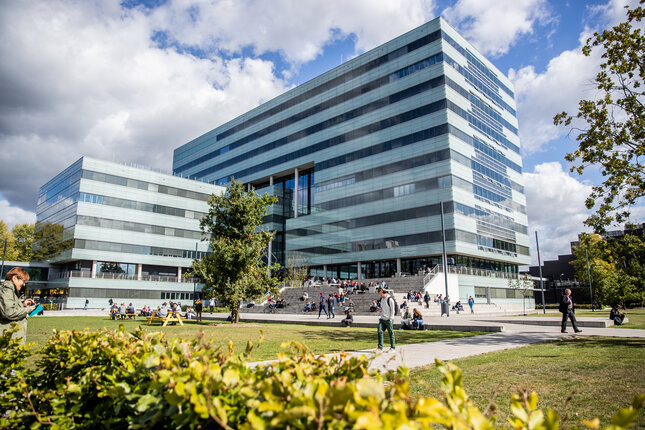
Unshakably positive
Unshakable positivity is also a quality Storm exudes on the social media platform Twitter, where he is very active. “Sometimes the vibe there tends to be a little grumpy, brusque and ill-informed, and you only need to downscroll to put a downer on your mood. I want to show other ways we can interact with one another, ways that may sometimes involve criticism, but are always respectful.
“I love humor and informality, and I show that on Twitter - and in my work. There’s little difference between my online persona and how I am in real life. Obviously you shouldn’t make bad jokes the whole time, and of course I can also be deadly serious. I take my role and the concerns around me extremely seriously, and am well aware of the huge responsibility I carry as dean. But even when things are tense, with humanity and lightheartedness and by working in concert, you can sometimes get people to view things through a different lens just for a moment. Humor helps us keep things in perspective, and it works well in situations where it’s appropriate.”
'I' and 'we'
As dean, Storm hopes to make ample use of informality and humanity. “I try to listen to people without having any preconceptions, and I like to view a situation from all angles. For me, building a personal connection and showing why I do things are vital. I believe that when you trust your colleagues, when you give them responsibility and freedom, they feel recognized and involved. Then they give their best. If you can facilitate this fundamental attitude, everything else, as they say, follows. There’s certainly no lack of talent: our coworkers are ambitious, energetic and enthusiastic.”
Storm realizes that his last remark about management style may come across as naive, and he is keenly aware that there will also be situations where the individual clashes with the collective. “That’s exactly what I love about leadership; that boundary between ‘I’ and ‘we’ is where you have narratives to tell and can make high-impact decisions. It all boils down to talking, weighing up vested interests, making decisions, and explaining why you’re making certain choices.”
Getting people on side is something he feels is important. “I don’t like it when discussions aren’t brought to a proper conclusion, when an issue keeps dragging on. However, there’s always someone who disagrees with a decision. Then I switch to ‘get things done’ mode, because there comes a point when we all have to be on the same page. That’s another moment when you need a good narrative.”
Creating a safe working environment together is the prerequisite for everything.
“Creating a safe working environment together is the prerequisite for everything. And I’m not just talking about safe labs; I also mean social safety of course. I want our staff to feel that they can be themselves here, that we treat one another honestly and respectfully - which doesn’t mean we can’t disagree with one another!”
Storm doesn’t yet have an overall picture of the state of social safety within his department. “Of course, we have our fair share of incidents of how you’d prefer things not to be, but as yet no extreme cases have come to my attention. Not that this says very much, and I’ve learned that it’s no basis for drawing conclusions. That’s why, together with the board, we’ll be looking closely at how we work here with one another, how leadership is given, and what we can learn from one another. All with a view to doing things even better.” And in this context, Storm has an important final message: “Look out for one another!”
More on our strategy
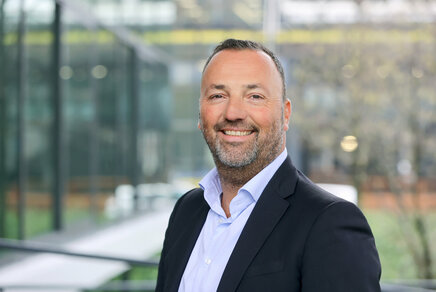

![[Translate to English:] [Translate to English:]](https://assets.w3.tue.nl/w/fileadmin/_processed_/c/f/csm_BvOF_2024_0319_AEV_license_TUe_Dirk_van_Meer_-_CORE_1__c976e259a5.jpg)
